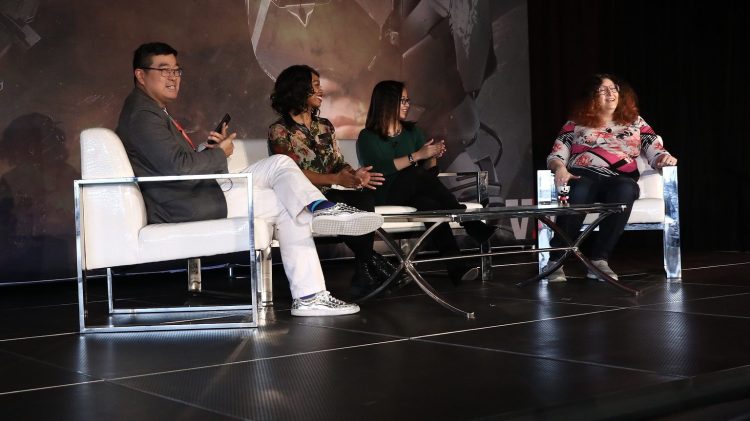Gamergate may have cast a long shadow across the game industry, but thanks to the #metoo and #timesup movements — and a little film called Black Panther — the tide is shifting, according to panelists at today’s GamesBeat Summit in Mill Valley, California. For the first time in gaming history, toxic gamers are losing esports deals and facing consequences for their actions, while developers are realizing that authentically diverse characters can help their games appeal to as many people as possible.
Moderated by Tipatat Chenavasin of The VR Fund, the Summit’s diversity panel included Olde Sküül CEO Rebecca Heineman, Sugar Gamers’ founder Keisha Howard, and GlassLab’s product engagement lead Paula Angela Escuadra. In response to a question by Chenavasin, the panelists agreed that the games industry is nearing a “Black Panther moment” where diverse characters are socially and financially beneficial, though they cautioned that gaming’s moment won’t look just like the film’s.
After explaining that diversity wasn’t just about checking “strong” and “minority” boxes, Escuadra said that Black Panther succeeded because it went beyond race and language, actively demonstrating an awareness of its characters’ distinctive cultures. Despite sharing a “hero prevails” theme with Marvel’s Thor: Ragnarok, Panther’s hero-king had his own unique power dynamics, and he surrounded himself with people who had skills he didn’t have. The authenticity of the characters, their motivations, and the societal misunderstandings they confronted really spoke to people.
Howard added that even with a large budget, a single game won’t have the impact of a single film. With a movie, “the viewer is consuming it in 2 hours, 15 minutes, and you’re done … but the beautiful thing about the video game industry is that there are so many different types of games, and players.” She expects that rather than one title impacting all viewers in the same way, multiple games across different genres will impact various types of people.
“Our Black Panther moment will look like something different that doesn’t have anything to do with our aesthetics,” Howard opined. “A really good game has customization: In Mass Effect, my Captain Shepard was amazing, because I could represent myself. [The film] Ready Player One had VR people who could look like cats. [In a game,] we’re no longer thinking about race or gender or age because we could be an alligator.”
As an early pro gamer — having won a 1980 national Space Invaders championship before going on to develop games herself — Heineman pointed out that the movement towards focusing on a player’s skills rather than their gender or race was “already underway.” In esports, she said, the only things that matter are your speed of thought and motion: “Do you suck or don’t you suck?”
Heineman noted that in video games, people in wheelchairs and intersex gamers can already compete on a level playing field rather than being segregated by physical traits or gender identity. To that point, she mentioned a League of Legends tournament that ejected a toxic gamer who was insulting an intersex woman, supporting and comforting someone who was contemplating leaving the sport.
All of the panelists agreed that esports are now providing some of gaming’s most powerful recent incentives for good behavior. “Now that there’s so much money especially going into esports, kids now understand if they’re going to create a lucrative career in gaming, they have to behave right,” said Howard. “You can’t hide behind anonymity. You can no longer really hide your behavior successfully… it’s not as easy as it once was to be a troll.”
Heineman went further. “To be a pro gamer, you give up some of your privacy, that’s just the way of the beast… if you wish to have a career in esports, you need to be on your best behavior when you play. Everything is recorded, no matter what you do, what you say, someone’s going to have a recording of it. It’s going to come back to haunt you.”
Chenavasin concluded the panel by asking each panelist for one piece of advice audience members could use to increase diversity or positivity around diversity. Escuadra’s top tip: “Ask someone who you trust what your blind spots could be. Being able to acknowledge what you may not be able to notice all the time is a good first step.” Similarly, Heineman told developers to “listen to your fans and customers. If people are complaining about your games, why are they? You may have a bias.”
Howard’s suggestion was particularly deep. Developers generally “want to hire the best people with the best skills,” she said, but there is a large community of people out there who bring special assets to the table — loyalty and diversity — if you’re willing to train them. “I don’t think the way people are hired is going to continue to work,” Howard said. “Game companies have to be open to developing talent, not just hiring people who are prepackaged ‘right.’ “

